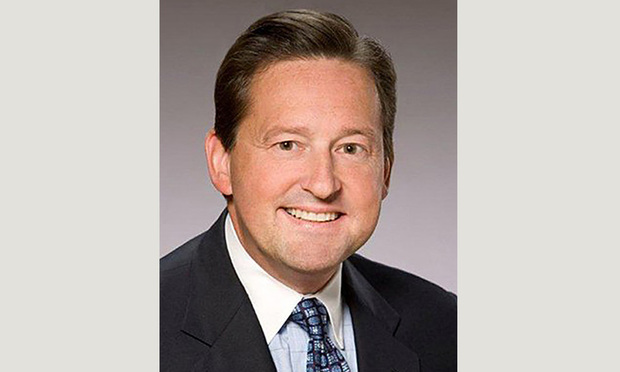Bouchard Denies IT Firm's Bid for $18M Indemnification for Exec's Defense in Bribery Probe
The Delaware Court of Chancery denied Computer Sciences Corp.'s bid to recoup about $18 million it had paid for an executive to defend against criminal investigations into an alleged bribery scheme stemming from the company's purchase of ServiceMesh Inc. in 2013.
May 21, 2019 at 05:06 PM
3 minute read
 Andre G. Bouchard.
Andre G. Bouchard.
The Delaware Court of Chancery on Tuesday denied Virginia-based information technology firm Computer Sciences Corp.'s bid to recoup about $18 million it had paid for an executive to defend against criminal investigations into an alleged bribery scheme stemming from the company's purchase of ServiceMesh Inc. in 2013.
Chancellor Andre G. Bouchard said in a 10-page letter opinion that the request by Computer Sciences, or CSC, for indemnification was “unreasonable” under the terms of its equity purchase agreement to acquire ServiceMesh for $260 million.
According to court documents, ServiceMesh's president, Eric Pulier, became the target of the federal probes, which accused the founder and former executive vice president of engineering a side deal to inflate ServiceMesh's revenue and trigger $98 million in earn-out payments from CSC to himself and other ServiceMesh equity holders.
All charges against Pulier were dropped in December 2018, according to news reports.
Before the case was dropped, the court ruled in 2017 that Pulier was entitled to advancement because the supposed bribery scheme involved his conduct as an officer of ServiceMesh. CSC, which is incorporated in Nevada and headquartered in Falls Church, Virginia, footed part of the bill of ServiceMesh's behalf, advancing Pulier approximately $18 million, the company said in court filings.
CSC, which sued Pulier in 2015, earlier this year moved for summary judgment on its indemnification claims. The firm argued that the the terms of the equity purchase agreement extended to any advancement claims that derived from the SeviceMesh board's approval of the acquisition or related transactions.
Bouchard, however, found the indemnification provision's scope was much more narrow. In order to trigger an indemnification obligation, he said, the underlying claims must challenge the board's authorization and approval of the agreement itself and not any tangential misconduct resulting from the deal.
“CSC's interpretation focuses on whether there is a nexus between the claims for which advancement was provided and the EPA or its related transactions rather than whether there is a nexus between the board's approval of the EPA or its related transactions and the claims for which advancement was provided,” he wrote in a letter to the parties.
“CSC does not contend that the ServiceMesh board ever authorized or approved the side agreement or that the side agreement was one of the transactions contemplated by the EPA. Nor could it,” Bouchard said. “This is because the claims for which Pulier obtained advancement from ServiceMesh all proceed from the premise that Pulier engineered the side agreement to circumvent the earnout provision in the EPA through an illegal scheme that the ServiceMesh board never authorized.”
An attorney for Pulier declined to comment. Counsel for CSC did not return a call Tuesday afternoon seeking comment on the ruling.
CSC was never accused of wrongdoing in connection with the acquisition.
CSC is represented by Peter J. Walsh, Jacob R. Kirkham and Jay G. Stirling of Potter Anderson & Corroon.
Pulier is represented by Martin S. Lessner, Elisabeth S. Bradley and Daniel M. Kirshenbaum of Young Conaway Stargatt & Taylor.
The case is captioned Computer Sciences Corp. v. Pulier.
This content has been archived. It is available through our partners, LexisNexis® and Bloomberg Law.
To view this content, please continue to their sites.
Not a Lexis Subscriber?
Subscribe Now
Not a Bloomberg Law Subscriber?
Subscribe Now
NOT FOR REPRINT
© 2025 ALM Global, LLC, All Rights Reserved. Request academic re-use from www.copyright.com. All other uses, submit a request to [email protected]. For more information visit Asset & Logo Licensing.
You Might Like
View All
Zoom Faces Intellectual Property Suit Over AI-Based Augmented Video Conferencing
3 minute read
Etsy App Infringes on Storage, Retrieval Patents, New Suit Claims


Law Firm Sued for $35 Million Over Alleged Role in Acquisition Deal Collapse
3 minute readTrending Stories
- 1Uber Files RICO Suit Against Plaintiff-Side Firms Alleging Fraudulent Injury Claims
- 2The Law Firm Disrupted: Scrutinizing the Elephant More Than the Mouse
- 3Inherent Diminished Value Damages Unavailable to 3rd-Party Claimants, Court Says
- 4Pa. Defense Firm Sued by Client Over Ex-Eagles Player's $43.5M Med Mal Win
- 5Losses Mount at Morris Manning, but Departing Ex-Chair Stays Bullish About His Old Firm's Future
Who Got The Work
J. Brugh Lower of Gibbons has entered an appearance for industrial equipment supplier Devco Corporation in a pending trademark infringement lawsuit. The suit, accusing the defendant of selling knock-off Graco products, was filed Dec. 18 in New Jersey District Court by Rivkin Radler on behalf of Graco Inc. and Graco Minnesota. The case, assigned to U.S. District Judge Zahid N. Quraishi, is 3:24-cv-11294, Graco Inc. et al v. Devco Corporation.
Who Got The Work
Rebecca Maller-Stein and Kent A. Yalowitz of Arnold & Porter Kaye Scholer have entered their appearances for Hanaco Venture Capital and its executives, Lior Prosor and David Frankel, in a pending securities lawsuit. The action, filed on Dec. 24 in New York Southern District Court by Zell, Aron & Co. on behalf of Goldeneye Advisors, accuses the defendants of negligently and fraudulently managing the plaintiff's $1 million investment. The case, assigned to U.S. District Judge Vernon S. Broderick, is 1:24-cv-09918, Goldeneye Advisors, LLC v. Hanaco Venture Capital, Ltd. et al.
Who Got The Work
Attorneys from A&O Shearman has stepped in as defense counsel for Toronto-Dominion Bank and other defendants in a pending securities class action. The suit, filed Dec. 11 in New York Southern District Court by Bleichmar Fonti & Auld, accuses the defendants of concealing the bank's 'pervasive' deficiencies in regards to its compliance with the Bank Secrecy Act and the quality of its anti-money laundering controls. The case, assigned to U.S. District Judge Arun Subramanian, is 1:24-cv-09445, Gonzalez v. The Toronto-Dominion Bank et al.
Who Got The Work
Crown Castle International, a Pennsylvania company providing shared communications infrastructure, has turned to Luke D. Wolf of Gordon Rees Scully Mansukhani to fend off a pending breach-of-contract lawsuit. The court action, filed Nov. 25 in Michigan Eastern District Court by Hooper Hathaway PC on behalf of The Town Residences LLC, accuses Crown Castle of failing to transfer approximately $30,000 in utility payments from T-Mobile in breach of a roof-top lease and assignment agreement. The case, assigned to U.S. District Judge Susan K. Declercq, is 2:24-cv-13131, The Town Residences LLC v. T-Mobile US, Inc. et al.
Who Got The Work
Wilfred P. Coronato and Daniel M. Schwartz of McCarter & English have stepped in as defense counsel to Electrolux Home Products Inc. in a pending product liability lawsuit. The court action, filed Nov. 26 in New York Eastern District Court by Poulos Lopiccolo PC and Nagel Rice LLP on behalf of David Stern, alleges that the defendant's refrigerators’ drawers and shelving repeatedly break and fall apart within months after purchase. The case, assigned to U.S. District Judge Joan M. Azrack, is 2:24-cv-08204, Stern v. Electrolux Home Products, Inc.
Featured Firms
Law Offices of Gary Martin Hays & Associates, P.C.
(470) 294-1674
Law Offices of Mark E. Salomone
(857) 444-6468
Smith & Hassler
(713) 739-1250






